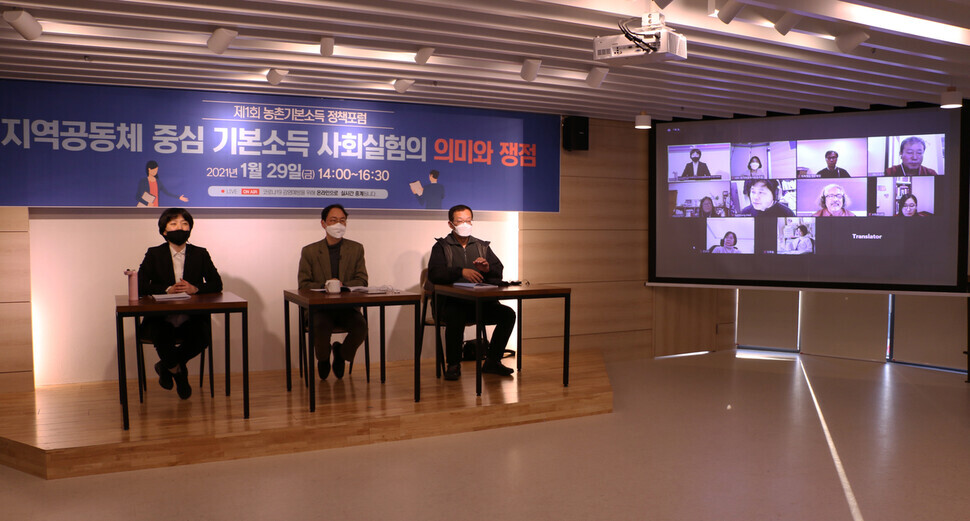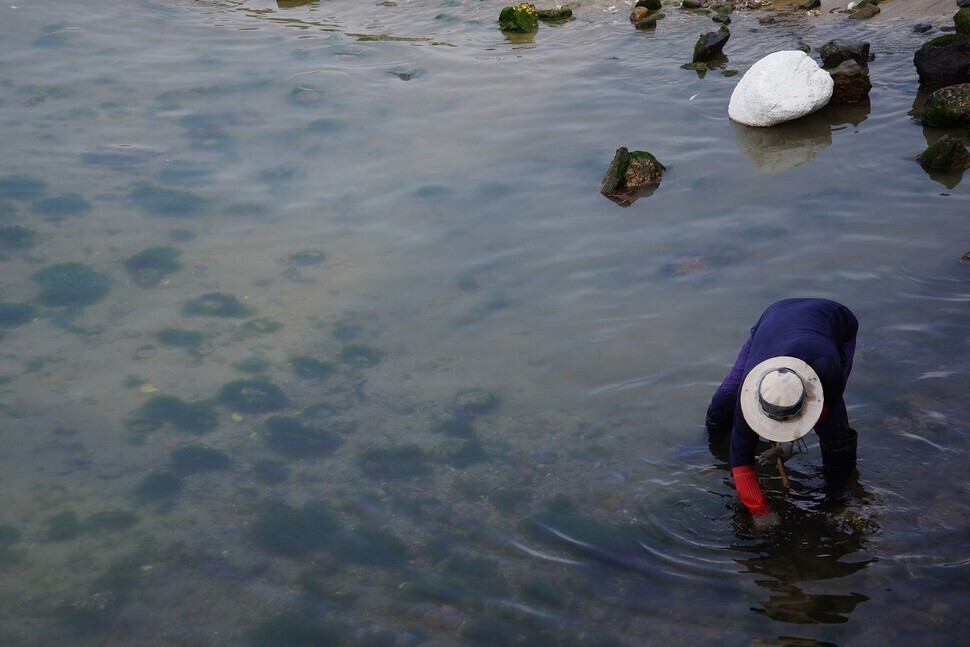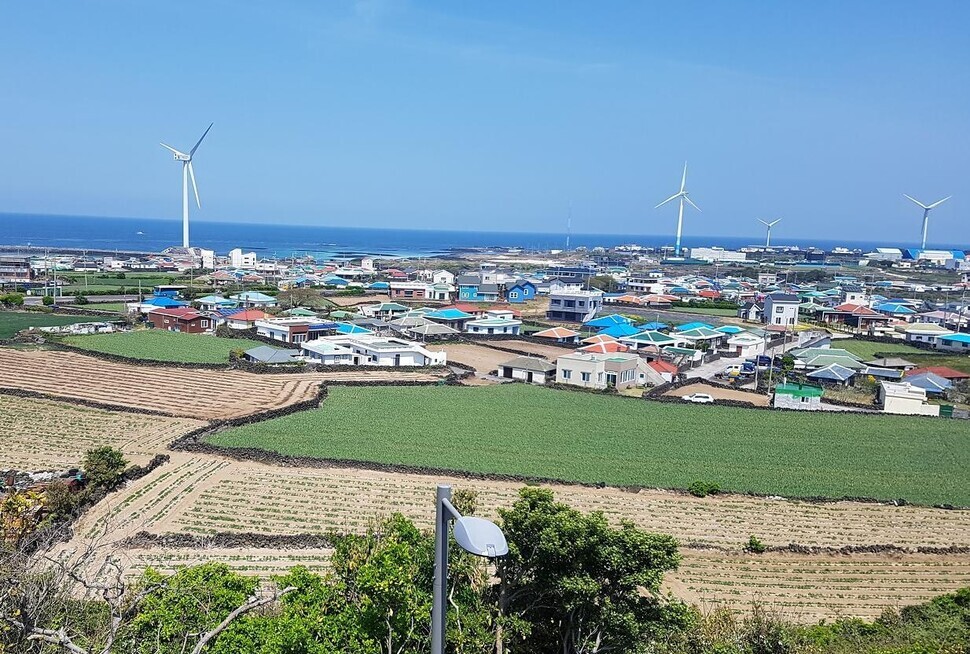hankyoreh
Links to other country sites 다른 나라 사이트 링크
Sea cucumber fisheries as shared property of islanders: "rediscovering rural basic income experiments"

The forum’s keynote speaker was Sarath Davala, the chief architect of India’s basic income experiment and chairman of the Basic Income District Network, which leads the discussion on basic income worldwide. He laid out the implications of basic income experiments conducted in India and Namibia.
Namibia and India conducted basic income experiments — in 2008 and 2011, respectively — during which Namibia paid US$12 and India US$4 per month to 2,000 people for 12 months. "Contrary to many people's expectations, people who received basic income did not become lazy. Start-up and economic activities increased, new transportation facilities were opened, school attendance rates rose, household debt decreased, and other good things occurred. In Namibia, the consumption of alcohol remained unchanged," Davala explained.
Davala also introduced changes in policies following basic income social experiments. "After the social experiment, the local government in India began providing cash allowances to all farmers proportional to their farmland area in 2018, and through this policy, the party won three-quarters of the local council. […] However, the program excluded sharecroppers and non-farmers, and allowances were paid only to landowners in rural areas, and basic income discussions focused mainly on 'the excluded.' [...] The implications of the Indian outcomes on other basic income experiments are that one needs to follow the principle of individuality and avoid excluding anyone in the region."
Davala emphasized the role of social experimentation in promoting social dialogue beyond the collection of evidence. "In the past, we did not conduct small-scale social experiments in advance before abolishing slavery or achieving women's suffrage. These policies were based on values, philosophy and human rights. Obviously, the policy effect rationale is important, but the policy is not implemented only with evidence. In India, political movements took place after social experiments, and there was a close review and public discussion of what was better," he said. Another aspect of the social experiment he emphasized is that it triggered dialogue between the public and the media, experts, and political parties to discuss desirable alternatives. "In Korea, there have been experiments with things such as youth dividends in Seongnam, a basic income for young people in Gyeonggi Province, and national disaster support funds amid the COVID-19 crisis, which has attracted the attention of politicians and the public."
Sea cucumber seeds become basic income for islandersThe forum also presented a case where a local community shares the profits generated from a shared asset. Kang Je-yoon, head of the Island Research Institute, explained how Janggo Island allocates the profits from its seafood sales to the islanders. Janggo, a small island with 81 households and 200 residents, began allocating profits from sea cucumber farming grounds in 1993. In 2019, 11 million won (around US$10,000) was paid annually to each household in basic income. Kang said, "Unlike other fisheries, sea cucumbers grow on their own when the residents sow seeds. There is nothing residents have to do until they are ready for harvesting. Janggo Island residents receive a basic income from sea cucumber farming, which requires minimal labor, and the same amount is allocated as labor income from collecting clams ten times over two months.” He continued, “Since the village community provides a basic income and labor income together worth 20 million won per year (US$19,000), Janggo Island residents earn equal and stable income, unlike residents of other islands, where large income gaps exist between those in the aquaculture industry and those who are not.

However, Janggo Island also went through a slow and painful process before residents received a consistent dividend. Initially, the fishing village fraternity rented out fishing grounds around Janggo Island to fish farmers, who paid rent to the village fraternity. Kang said, "It is illegal to rent out fishing grounds, which no one owns, and besides that, the rent was 500,000 won (US$450) a year, which was an absurdly low price for 1983. In 1983, the village's newly appointed head persuaded residents to reclaim the fishing grounds. After that, they managed the profits from the fishing grounds (now village property) for ten years and gave out loans. After much controversy, the dividend program first began in 1993, and residents' complaints about fishing grounds profits subsided, and the community's common interest in the fishing grounds increased the quality of management." For Janggo Island, a fair distribution system helped to sustain the management of shared assets.
Kim Ja-kyung, an academic research professor at Jeju National University, who presented on the possibility of allocating basic income through shared assets on Jeju Island, said, "Jeju Island has a tradition of distributing profits through communal operation of pastureland and fisheries. For example, residents at one village harvest seaweed fusiforme and agar together and distribute them among themselves while allowing individuals to keep sea mustard they collected. One hundred and one fishing village fraternities had their unique customs and order."
Recently, wind has been drawing greater attention as a new shared asset on Jeju Island. Kim gave a wind farm in Haengwon Village, Gujwa Township, eastern Jeju Island, as an example. "Six neighborhoods in Haengwon receive part of wind power generation profits and set aside the funds,” Kim said. “There is always a possibility of conflict and disagreement in the village, which prevents certain people from arbitrarily exercising their decision-making authority." More work is to be done to develop a system that fairly distributes profits from share assets.

Lee Chang-han, director of the Korea Regional Development Foundation, which designed the basic income social experiment in rural areas of Gyeonggi Province, said the experiment's primary purpose is to closely examine the impact of basic income on the local community. “Because of the name ‘basic rural income,’ many people are confused about whether it only benefits farmers. However, farmers in rural areas in Gyeonggi Province account for about 16% of the total population. It is crucial how farmers and non-farmers interact in the same living space in these rural areas. Like Janggo Island, we will observe the impact of the distribution system on resident communities.”
Park Kyung-chul, a researcher at the Chungnam Research Institute, said, "Since 2019, various local governments have introduced farmers' allowances, and there has been a discussion on farmers' basic income.” He added, “However, the scope of payments is expanded to include all rural residents in basic rural income, since non-farmers are also, directly or indirectly, involved in agricultural activities and are part of local communities.”
Lee Ji-eun, the CEO of the Basic Income New Research Network, said, "The basic income social experiment in rural areas can be reevaluated in terms of climate justice.” She added, "We hope this experiment will lead to discussions on rediscovering 'the commons’ (shared assets), discovering small sustainable economic models and revitalizing ecological feminism, reflecting the peculiarity of rural areas.”
Lee Won-jae, the CEO of Lab2050, who headed the debate, said, "I think the basic income social experiment in Gyeonggi Province has a unique status, as does the basic income experiment in Finland […] where the prime minister in power conducted a policy experiment. In Korea, the experiment is taking place when basic income is becoming a central political topic,” suggesting that the country's overall policy may follow the experiment’s results.
By Yoon hyeong-joong, visiting fellow at the Hankyoreh Economy and Society Research Institute
Please direct comments or questions to [english@hani.co.kr]

Editorial・opinion
![[Column] Season 2 of special prosecutor probe may be coming to Korea soon [Column] Season 2 of special prosecutor probe may be coming to Korea soon](https://flexible.img.hani.co.kr/flexible/normal/500/300/imgdb/original/2024/0426/3317141030699447.jpg) [Column] Season 2 of special prosecutor probe may be coming to Korea soon
[Column] Season 2 of special prosecutor probe may be coming to Korea soon![[Column] Park Geun-hye déjà vu in Yoon Suk-yeol [Column] Park Geun-hye déjà vu in Yoon Suk-yeol](https://flexible.img.hani.co.kr/flexible/normal/500/300/imgdb/original/2024/0424/651713945113788.jpg) [Column] Park Geun-hye déjà vu in Yoon Suk-yeol
[Column] Park Geun-hye déjà vu in Yoon Suk-yeol- [Editorial] New weight of N. Korea’s nuclear threats makes dialogue all the more urgent
- [Guest essay] The real reason Korea’s new right wants to dub Rhee a founding father
- [Column] ‘Choson’: Is it time we start referring to N. Korea in its own terms?
- [Editorial] Japan’s rewriting of history with Korea has gone too far
- [Column] The president’s questionable capacity for dialogue
- [Column] Are chaebol firms just pizza pies for families to divvy up as they please?
- [Column] Has Korea, too, crossed the Rubicon on China?
- [Correspondent’s column] In Japan’s alliance with US, echoes of its past alliances with UK
Most viewed articles
- 1AI is catching up with humans at a ‘shocking’ rate
- 2‘We must say no’: Seoul defense chief on Korean, USFK involvement in hypothetical Taiwan crisis
- 3[Column] Season 2 of special prosecutor probe may be coming to Korea soon
- 4Division commander ordered troops to enter raging flood waters before Marine died, survivor says
- 5Is Japan about to snatch control of Line messenger from Korea’s Naver?
- 6Korea protests Japanese PM’s offering at war-linked Yasukuni Shrine
- 7Is N. Korea threatening to test nukes in response to possible new US-led sanctions body?
- 8One Hyundai worker suffers through 16 piecemeal contracts in 23 months
- 9[Photo] Migrant workers rally for labor rights
- 10Korea once again ranks near bottom of list for gender parity, report shows